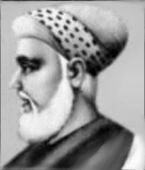- Mirza Rafi Sauda
-
Mirza Muhammad Rafi 'Sauda' (1713–1781) (Urdu: مرزا محمد رفیع سودا ) was one of the best known poets of Urdu language in Delhi, India. He is known for his Ghazals and Urdu Qasidas.[1]
Contents
Early life
His birth year has not been confirmed and in some publications, it is listed as A.H. 1125 [1713-14].[2] He was born and bought up in Delhi.[3] Sauda, was a shia in personal life.[4]
He inhabited Shahjahanabad (i.e. Old Delhi), during the reign of Muhammad Shah, 1150 A.H. i.e. 1739 A.D.[5]
Ustads and shagirds
Sulaimān Qulī Ḳhān 'Vidād'[6] was his first Ustad (teacher of Urdu poetry) and Shāh Ḥātim too, in the introduction to his volume in which he provides a list of his pupils has recorded Mirzā's name.[7][2] King Shah Alam was Shagird (student of Urdu poetry) of 'Sauda' and gave him his poetry for correction.[2]
He was a contemporary of Dard and Mir.[5]
Movement from Delhi
At the age of sixty or sixty six, he left Delhi and came to Farrukhabad(with Nawab Bangash),[2] and lived there from 1757 to about 1770[3][8] In A.H. 1185 [1771-72] he moved to court of Nawab of Awadh (then in Faizabad) and remained ther till his death.[3] When Lucknow became state capital, he came there with Nawab Shujauddaula.[5] He was also Ustad of Shujauddaulla. Nawab Āṣif ud-Daulah gave him tiltle of Malkushshu'ara and annual pension of Rupees Six Thounsand.[2]
He died in at the age of almost 70 years,[9] in A.H. 1195 [1780-81],[3] in Lucknow.[2]
Works
He is recognized as a great qasidah poet, perhaps the greatest in Urdu. He was a major ghazal poet too. The soundest rock on which Sauda’s reputation rests today are his satires.[4]
At first he always used to compose verses in Persian then on his ustad Ḳhān-e Ārzū's advice he started composing in Urdu.[2] Kulliyat of Sauda was compiled by Ḥakīm Sayyid Aṣlaḥ ud-Dīn Ḳhān he wrote an introduction for it.[2] Later in 1872 it was literally translated by Major Henry Court, Captain, Bengal Cavalry [10] List of Sauda's work from his Kulliyat are:[11]
- Masnavi dar hajv-e hakim ghaus,
- Masnavi dar hajv-e amir-a daulatmand bakhil,
- Masnavi dar ta'rif-e shikar,
- Masnavi dar hajv-e pil rajah nripat singh,
- Masnavi dar hajv-e sidi faulad khan kotval-e shahjahanabad,
- Masnavi dar hajv-e fidvi mutavatan-e panjab kih darasal baqal bachchah bud,
- Masnavi dar hajv-e chipak mirza faizu,
- Qissah-e darvesh kih iradah-e ziyarat-e ka'bah kardah bud,
- Mukhammas-e shahr ashob,
- Qasidah dar madh-e navab vazir imad ul-mulk
Some famous ashaar (more than one sher) of 'Sauda'
1.
“ kisii ka dard-e-dil pyaare tumhaara naaz kya samjhe
jo guzre said ke dil par use shahbaaz kya samajhe
” —Sauda
2.
“ badla tere sitam ka koii tujhse kya kare
apana hii tu farefta howe, kh.uda kare
” —Sauda
3.
“ shama-roo kahna use Sauda hai taareeki-e-aql
shama ka aks uske aariz par kalaf hai maah kaa
” —Sauda
4.
“ ishq zarra bhii agar ho to use kam mat jaan
hoke shola hii bujhe hai ye sharaar aakh.irkaar
” —Sauda
5.
“ mulaayam ho gayiin birah kii saa'itein karDiyaan
pahar kaTne lage unbin jinhon bin kaaTtii gharDiyaan
” —Sauda
6.
“ ye rutbaa jaah-e-duniya ka nahiin kam kisii maalzaadii se
ki is par roz-o-shab mein saikarDo charDhte-utarate hain
” —Sauda
7.
“ nai bulbul-e-chaman na gul-e-naudmeeda hoon
main mausam-e-bahaar mein shaakh.-e-bareeda hoon
giriyaan na shakl-e-sheesha wa kh.anda na tarz-e-jaam
is maikade ke beech abas aafreeda hoon” —Sauda
8.
“ cheez kya hoon jo karein qatl wo aMkhiyaan mujhko
phir gaye dekh ke muMh kh.anzar-e-mizgaan mujhko
” —Sauda
9.
“ gada dast-e-ahl-e-karam dekhte hain
ham apna hii dam aur qadam dekhte hain
” —Sauda
10.
“ shaikh. ne us but ko jis kooche mein dekha shaam ko
le charag ab DhooMrDhe hai waan ta-sehar islaam ko
” —Sauda
11.
“ tabee'at se faromaya kee sher-e-tar nahiin hota
jo aab-e-chaah ka qatra hai wo gauhar nahiin hota
talaash-e-khijr bahr-e-manzil-e-maqsad na kar Sauda
koii khudraftagii se raahbar behtar nahiin hota” —Sauda
12.
“ saawan ke baadalon kii tarah se bhare hu'e
ye wo nayan hain jinse ki jangal hare hu'e
” —Sauda
References
- ^ A Shahr-ashob of Sauda, translated by Mark Pegors
- ^ a b c d e f g h Aab-e hayaat (1880) on Sauda
- ^ a b c d Chapter 2 of Three Mughal Poets: Mir Sauda, Mir Hasan*, by Ralph Russell and Khurshidul Islam (Cambridge: Harvard University Press, 1968)
- ^ a b The Satires of Sauda (1706-1781) (Sept. 2010), by Shamsur Rahman Faruqi
- ^ a b c Introduction of Selections from the Kulliyat of Sauda, by Major Henry Court, 1872
- ^ Mirzā Muḥammad Zamān was known as Sulaimān Qulī Ḳhān; his grandfather came of Isfahani stock. He himself was born in Delhi. He led an honored life in the employ of Navab Mūsavī Ḳhān; he received three hundred rupees a month and pleased himself by reciting verses. See Muṣḥafī's anthology of Persian poets.
- ^ Azad, Muhammad Husain Ab-i hayat: yani mashahir shura-yi Urdu ke savanih umri aur zaban-i mazkur ki ahd ba ahd ki taraqqiyon aur islahon ka bayan. Lahor: Naval Kishor 1907
- ^ To be more precise, some time between A.H. 1183 (A.D. 1769-1770) and A.H. 1185 (A.D. 1771-1772). Cf. Shaikh Cand, pp. 55-56
- ^ An Urdu chronogram by Faḳhr ud-Dīn; Persian chronograms by Muṣḥafī and Mīr Qamar ud-Dīn 'Minnat'.
- ^ Selections from the Kulliyat of Sauda, by Major Henry Court, 1872
- ^ Introduction by FWP, Selections from the Kulliyat of Sauda, by Major Henry Court, 1872
External links
1.Professor Nasim Ahmad's Books (a). Diwane-e-Ghazaliyat-e-Sauda and (b).Mutallaqate Sauda www.bhu.ac.in/urdu/NaseemAhmad.html 2. Vinay Prajapati 'Nazar' Wordpress Blog तख़लीक़-ए-नज़र - Expanding day by day.
Categories:- 1713 births
- 1781 deaths
- Urdu poets
- People from Delhi
- People from Farrukhabad
- People from Faizabad
- People from Lucknow
Wikimedia Foundation. 2010.

